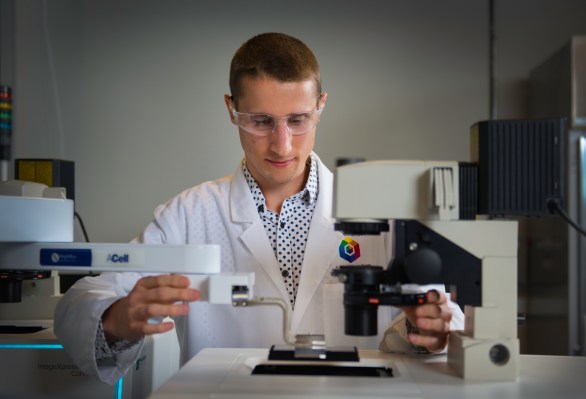Recursion, a drug discovery startup out of Salt Lake City, Utah has announced a $60 million Series B round, led by Data Collective (DCVC).
Recursion started out in 2014 on a mission to identify 100 new treatments in 10 years. That’s a lofty goal, considering the discovery for just one drug can traditionally take decades and tens of millions of dollars, with a high rate of failure before anything comes of the research.
However, the startup uses machine learning to process and rapidly discover new drug treatments for diseases in a fraction of the time and cost.
“What we’re doing is turning biology into a data science problem,” Gibson tells TechCrunch.
That’s something Silicon Valley investors are getting behind as more venture funds have started to pour money into biotech startups over the past few years.
Recursion’s approach is similar to Y Combinator’s Notable Labs in that it uses imaging of cells combined with machine learning to identify which drugs will work best without waiting years to go through trial and error. However, Notable focuses on just one particular kind of disease — cancer. Recursion takes a broader approach, sifting through possible chemical combinations for an average of eight diseases a week, according to co-founder Chris Gibson.
“It’s the inverse of what the industry typically does,” Gibson says. “They spend a lot of time upfront trying to understand the disease and then two to three years down the road they look to see if they have a compound that might work. Sometimes they do and sometimes they don’t.”
However, Recursion spends very little time focusing on the disease at the beginning. Instead, it uses that image-based approach to look at promising compounds.
Of course, identifying possible compounds is just the first part. Recursion will still need to take those drugs through clinical trial.
It’s also in a crowded industry with a lot of competition from bigger drug makers. But, Gibson points out, Recursion owns all the data it uses and there are thousands of diseases still out there without a treatment so the opportunity is wide.
But even with lots of good data, machine learning technology and a big field, biotech still takes much more capital to get it off the ground. Of course, discovering a new drug can be very lucrative and margins in the pharmaceuticals industry continue to soar.
Lux Capital, which led Recursions Series A round, jumped in again for this round, along with previous participants Obvious Ventures, Advantage Capital, Felicis, Epic, and AME. New investors include Mubadala, Menlo Ventures, CRV, Two Sigma and various angel investors.
Recursion had previously raised $20 million, bringing the total in the coffers up to $80 million.
